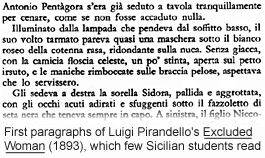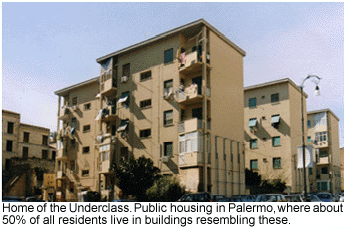...Best of Sicily presents... Best of Sicily Magazine. ... Dedicated to Sicilian art, culture, history, people, places and all things Sicilian. |
by Maria Luisa Romano | ||||
Magazine Index Best of Sicily Arts & Culture Fashion Food & Wine History & Society About Us Travel Faqs Contact Map of Sicily
|
"The education level of adults in Italy between the ages of 25 and 64 is among the lowest in the European Union: 25% of the population has no more than an elementary school diploma, 30% of teenagers between 15 and 19 have already left school, as compared with a European average of 20%, and only 42% have earned a diploma, as compared with a European average of 59%. Only 10% of the population studies at university (European average 26%) and only 38 persons out of 100 read at least one book a year, compared with the European average of 70. Italians even continue to read their daily papers very little: 102 copies for every 1000 inhabitants, compared with over 300 in Germany, Great Britain, Austria and the Scandinavian countries." That's right. Italians read fewer books (per capita) than anybody else in Europe. By most accounts, the situation in Sicily reflects conditions worse than the national average. It is believed that at least 40% of Sicilians leave high school before graduation (at 19), despite the recent increase in mandatory school attendance until 16 and (soon) to 18. Truancy is a serious problem, especially in Palermo, where the semi-employed or unemployed "underclass" constitutes perhaps half the local population. Incredible? You bet. Most of Italy's public primary and secondary (high) schools may not seem exceptional but some of the specialised high schools (licei), offering good specialisations in languages, classical studies or physical sciences, can hardly be considered mediocre, even if their modern history courses are lacking in scope (heavily Eurocentric, little about the Inquisition, and very little Italian national history post-1920). Sicilian universities are not paradise, but the real problem in Sicily is basic education. How did it get this bad? How did we go from an estimated 40% literacy level during the early thirteenth century reign of Frederick II to 15% in the nineteenth century and a bizarre state of "marginal" literacy today? How is it possible that Palermo, a city of nearly a million, has only seven or eight "large" bookstores? There are no simple answers. Clearly, however, it's a serious matter
when the populations of Milan and Bologna are demonstrably better-educated
than those of Palermo and Catania. The statistics are only Sure, a few Sicilians excel intellectually; that isn't being debated here. The root of the problem is reflected in a simple statistical reality confirmed by everyday observations. For example, around Palermo's Piazza Politeama on warm Saturday evenings (around 6 or 7) you'll encounter thousands of children of the underclass (equipped with cell phones and bad attitudes) wandering around shouting, screaming and acting in an undisciplined manner. These teenagers are Sicilians. The children of the new immigrants (Arabs, Indians, Chinese) are probably home, or at least off the streets, perhaps studying. In a generation or less the people of Sicily will swallow a difficult, and possibly bitter, pill when the children of the immigrants successfully compete against them for whatever wealth is available. But who is to blame when the immigrants seek higher education as the mass of "natives" choose to drop out of school before graduation time or fail to attend university? Gone are the days when an illiterate Sicilian bricklayer could seek work in America; most countries now have strict immigration policies that favour highly skilled professionals, while here in the European Union Germany and the United Kingdom rarely embrace Italian immigrants with what could be described as "open arms." ZEN, Borgo Vecchio, Brancaccio, Via Oreto, Villa Tasca. These are Palermo's worst areas, where education levels descend to new depths. Nothing in Catania is nearly this desperate, though that city has some underdeveloped neighbourhoods, too. The universities and specialised licei do not discriminate based on social class. (They don't care which part of town the students come from.) If the children of lesser-educated Sicilians fail to attend these schools, it is because of low academic achievement and lack of motivation, plain and simple. Public education is compulsory up to age 16, but the law is virtually useless unless it is enforced. Moreover, the roots of the problem are essentialy societal. Individual families (and parents), not the state, are at fault here. In Sicily borderline literacy is generational (very few families possess heirloom books, partly because most Sicilians born before 1900 simply could not read, a fact verified by consultation of vital statistics records). The difference in education and wealth between social classes is an invisible chasm separating Sicilian society itself into the "haves" and the "have-nots," a fact made clear by the American documentary film Cortile Cascino and its sequel (see box). Journalists who regard the Mafia as "Sicily's dirty secret" are mistaken --though poverty and poor education create a favorable climate for crime. The real secret, which Sicilians themselves are inclined to minimise or conceal, is the terribly low educational level of so much of the island's population. It's one thing to overlook the illiteracy of the generation born in the era of The Duce, but the failure to educate younger people is terrible by any measure. What's worse, hardly anybody seems to care. Most better-educated Sicilians simply just accept the existence of the poor, and poorly educated, lower classes as an unpleasant but undisturbing fact of life. Why is this problem so often overlooked? It is overshadowed by what seem to be more immediate problems --scandals like Sicily employing three times as many forest rangers as British Columbia, and "absentee" members of the Sicilian Regional Assembly getting paid over twenty thousand euros per month for very little service. Is the education problem really very serious? After all, every place has its social issues. (An example is teenage obesity in the United States.) But low educational standards, or whatever factors cause a population to have so many poorly educated citizens, are extremely dangerous. In Sicily's recent regional elections (pitting Totò Cuffaro against Rita Borsellino), it was clear that the poorly-educated masses were voting for a candidate based on conformity rather than education about the issues. This human tragedy is just one example of what happens when education is not a priority. The so-called "divario" is another; this is the evolution of Italy into a nation of rich and poor, readers and non-readers, informed and uninformed, with very little in-between --a phenomenon which would (and should) shock those who consider a large middle class to be the backbone of any society. The "miniskirt factor" is also related to this; this colourful phrase describes young Italian women who pursue superficial goals rather than intellectual ones, and it's not as "funny" as it sounds if you consider the extremely poor choice of genuine career opportunities available to most Sicilian women. It would be nice to present solutions instead of criticisms. The first part of any solution is recognition that a problem exists. This really has not yet happened in Sicily. Only when it does will a better day appear on the horizon. About the Author: Maria Luisa Romano has written for various Italian magazines, including this one. | |||
Top of Page |
 It's one of the questions that enters your mind when you think about
a particular country, a particular place: "What are the educational
standards like?" It may be an abstract curiosity, or it may grow out
of your concern for your own children's education. Here's what the Italian
Foreign Ministry has to say about education in Italy:
It's one of the questions that enters your mind when you think about
a particular country, a particular place: "What are the educational
standards like?" It may be an abstract curiosity, or it may grow out
of your concern for your own children's education. Here's what the Italian
Foreign Ministry has to say about education in Italy: the tip of the iceberg. Anybody who lives in Palermo knows that it is commonplace --perhaps
normal-- to encounter young people who seem to lack the most rudimentary
knowledge and skills, and the circumstances don't bode well for the future
of this region whose fragile economic base is already at serious risk.
the tip of the iceberg. Anybody who lives in Palermo knows that it is commonplace --perhaps
normal-- to encounter young people who seem to lack the most rudimentary
knowledge and skills, and the circumstances don't bode well for the future
of this region whose fragile economic base is already at serious risk.